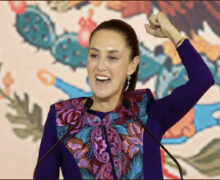
Declaración de esencialidad de las Iglesias
Declaration of essentiality for Churches
“Hay que recordar a la iglesia que no es ni el amo ni el siervo del estado, sino la conciencia del Estado. Debe ser la guía y el crítico del estado, y nunca su herramienta. Si la iglesia no recupera su celo profético, se convertirá en un club social irrelevante sin autoridad moral o espiritual”.
— MARTIN LUTHER KING JR.
El Día de Pentecostés también es conocido como el cumpleaños de la iglesia cristiana. El 31 de mayo del 2020 es el aniversario número 1,990 del Día de Pentecostés original que tuvo lugar en el año 30 d.C. Declaramos que el 31 de mayo del 2020, o antes, reanudaremos el culto corporativo como se indica en Hebreos 10:24-25.
Frente a la pandemia COVID-19, la iglesia cristiana y otras religiones han sido relegadas a la condición de “no esenciales” por los organismos rectores en todo Estados Unidos. Pero nosotros, los firmantes de esta declaración, creemos y sostenemos que reunirnos en comunión y adoración es “esencial”.
Como ministros del Evangelio, hemos cumplido con las órdenes de los órganos de gobierno de dejar de reunirnos en persona como ha sido nuestra práctica durante casi 2000 años desde el primer Día de Pentecostés. Respetamos a las autoridades de gobierno y su papel en la seguridad pública. Sin embargo, las autoridades rectoras han suspendido nuestras reuniones indefinidamente, negándose a proporcionar una fecha en la que podamos comenzar legalmente nuestra práctica de adorar a Dios juntos en nuestras casas de adoración. Si bien estamos agradecidos con las autoridades rectoras por los importantes esfuerzos realizados para proteger al público de COVID-19, la amenaza restante de COVID-19 se ve compensada por las severas restricciones al libre ejercicio de nuestra religión que consideramos “esenciales.” Estamos comprometidos con la seguridad pública y seguiremos las directrices razonables establecidas y aplicadas a organizaciones situadas de manera similar.
Fundamental para el derecho de la Primera Enmienda al libre ejercicio de la religión es el derecho a reunirse y adorar. [1] La Primera Enmienda requiere que la carga impuesta al libre ejercicio de la religión se adapte estrechamente para servir al interés gubernamental en impedir la propagación de COVID-19. Aquí, tal como ocurrió en el caso de la Corte Suprema de los Estados Unidos titulado Iglesia de los Lukumi Balalu Aye, Inc. c. Ciudad de Hialeah, los “objetivos ofrecidos por el gobierno no se persiguen con respecto a la conducta no religiosa análoga, y esos intereses podrían lograrse mediante ordenanzas más estrechas que agobien la religión en un grado mucho menor”. [2] Las órdenes gubernamentales actuales no se adaptan por poco aquí porque innumerables empresas seculares y lugares donde la gente se reúne se consideran esenciales, incluyendo aquellos que plantean riesgos aún mayores de COVID-19 que las asambleas religiosas.
AHORA, POR LO TANTO, DECLARAMOS QUE REANUDAREMOS LAS ASAMBLEAS RELIGIOSAS EN PERSONA A PARTIR DEL DÍA DE PENTECOSTÉS, 31 DE MAYO DE 2020, O ANTES.
“The church must be reminded that it is not the master or the servant of the state, but rather the conscience of the state. It must be the guide and the critic of the state, and nev er its tool. If the church does not recapture its prophetic zeal, it will become an irrelevant social club without moral or spiritual authority.”
— MARTIN LUTHER
KING JR.
The Day of Pentecost is also known as the birthday of the Christian church. May 31, 2020 is the 1,990th anniversary of the original Day of Pentecost that occurred in the year A.D. 30. We declare that on May 31, 2020, or sooner, we will resume corporate worship as instructed in Hebrews 10:24-25.
Facing the COVID-19 Pandemic, the Christian church and other faiths have been relegated to “nonessential” status by governing agencies throughout the United States. But we, the signers of this declaration, believe and contend that gathering together in fellowship and worship is “essential.”
As ministers of the Gospel, we have complied with the orders of governing bodies to cease meeting in-person as has been our practice for nearly 2000 years since the first Day of Pentecost. We respect the governing authorities and their role in public safety. However, the governing authorities have suspended our meetings indefinitely, refusing to provide a date upon which we can lawfully commence our practice of worshiping God together in our houses of worship.
While we are thankful to the governing authorities for the significant efforts made to protect the public from COVID-19, the remaining threat of COVID-19 is outweighed by the severe restrictions upon the free exercise of our religion that we deem “essential.” We are committed to public safety and will follow reasonable guidelines established and applied to similarly situated organizations.
Fundamental to the First Amendment right to the free exercise of religion is the right to gather and worship.[1] The First Amendment requires that the burden imposed on the free exercise of religion be narrowly tailored to serve the governmental interest in preventing the spread of COVID-19. Here, just as occurred in the U.S. Supreme Court case entitled Church of the Lukumi Balalu Aye, Inc. v. City of Hialeah, the government’s “proffered objectives are not pursued with respect to analogous non-religious conduct, and those interests could be achieved by narrower ordinances that burdened religion to a far lesser degree.”[2] The current governmental orders are not narrowly tailored here because innumerable secular enterprises and places where people gather are deemed essential, including those that pose even greater risks of COVID-19 than religious assemblies.
NOW THEREFORE, WE DECLARE THAT WE WILL RESUME IN-PERSON RELIGIOUS ASSEMBLIES BEGINNING ON THE DAY OF PENTECOST, MAY 31, 2020, OR SOONER.
[1] See W. Va. State Bd. of Educ. v. Barnette, 319 U.S. 624, 638 (1943) (“The very purpose of a Bill of Rights was to withdraw certain subjects from the vicissitudes of political controversy, to place them beyond the reach of majorities and officials and to establish them as legal principles to be applied by the courts … [such as the] freedom of worship and assembly.” This protection was incorporated against the states in Cantwell v. Connecticut, 310 U.S. 296 (1940).
[2]Church of the Lukumi Balalu Aye, Inc. v. City of Hialeah, 508 U.S. 520, 546 (1990).
























